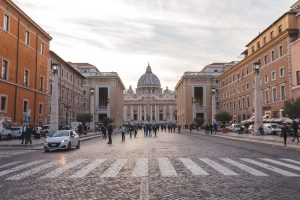
In 2019, the International Theological Commission of the Catholic Church released the Declaration “Religious Freedom for the Good of All: Theological Approaches and Contemporary Challenges.” The Declaration studied the theme of religious freedom in the contemporary (more liberal, secular, pluralistic, and relativistic) world and offers an updated Catholic doctrine of this fundamental right developed in the 1965 Declaration Dignitatis Humanae.
This series offers a set of essays written from various perspectives—Catholic, Orthodox, and secular—and with different outcomes—more positive and supportive (Pin, Gas Aixendri, Künkler,and Stein), and more critical (Patrick)—concerning both ideas and approaches articulated in the 2019 Declaration and its political implications.
The series starts with Andrea Pin’s take on the role of religion in the public sphere. Pin argues that religion seeks for a place in the public forum to perform its function “to speak unspeakable”—to remind individuals of their biggest existential questions and help them to deal with these questions. According to Pin:
Religious freedom is good for everyone. This is not just because religions can nurture a sense of morality, respect, decency, or honesty. Their deepest meaning does not lie in the civic virtues they foster, although religious traditions have played a crucial role in developing them. Their greatest—their own virtue—lies in their capacity to deal with things that human beings are afraid to handle: speaking the unspeakable.
Monserrat Gas Aixendri discusses the 2019 Declaration’s critique of the liberal doctrine of the neutral state as the one, in some cases, marginalizing believers and preventing them from contributing to public debates. Following Benedict XVI’s conception of positive secularism Gas Aixendri points out that
[T]he secular State must actively cooperate and promote a constructive dialogue between the public Powers and religious organizations. It is also necessary to recognize the various groups (without excluding religious ones), the full right of participation in public decisions. To build a more democratic and plural society, it is necessary to create an open space in which all voices can be heard.
Mirjam Künkler and Tine Stein reflect on the 2019 Declaration through the lens of Ernst-Wolfgang Böckenförde, a prominent German constitutionalist, a justice of the German Constitutional Court, and Catholic thinker. Künkler and Stein believe that Böckenförde would reject applying the concept of “soft totalitarianism” to an aggressively secularist regime as the Declaration appears to do (para. 4), but
Overall, with its affirmation of the secular state, of the role of natural law as an individual ethos instead of a basis for state law, its rejection of exclusionary and aggressive forms of secularism, its views of the role of the state as being entrusted with securing the common good and protecting religious liberty, and its embrace of freedom of conscience, Böckenförde would have welcomed the 2019 Declaration and viewed it as largely congruous with his own calls for inner-church reform stretching six decades from 1957 to 2017.
Finally, Jeremy Patrick challenges one of the main premises of the 2019 Declaration—its critique of the neutral state as an ideology hostile towards religion. Patrick argues that religious neutrality means not hostility, but indifference, which is beneficial to religious freedom. He also reminds that despite occasional violations of religious freedom by liberal states
[I]t is worth remembering that the ideal of state neutrality toward religion did not spring forth yesterday from latte-sipping liberals in a trendy Los Angeles café. The concept that the government should not have a religion, and should not even put a thumb on the scale of which religion (if any) a person chooses, was a pragmatic insight derived from centuries of experience with the alternative.
Posts in the series:
Andrea Pin. The Place of Religion in the Public Sphere: Speaking the Unspeakable
Montserrat Gas Aixendri. Contemporary Challenges of Religious Freedom: State Neutrality and the Role of Religion in Public Life
Mirjam Künkler&Tine Stein. Böckenförde, Religious Freedom and the Open Neutrality of the State
Jeremy Patrick. Neutrality and “Religious Freedom for the Good of All”
